#wh40k fan fiction
Text
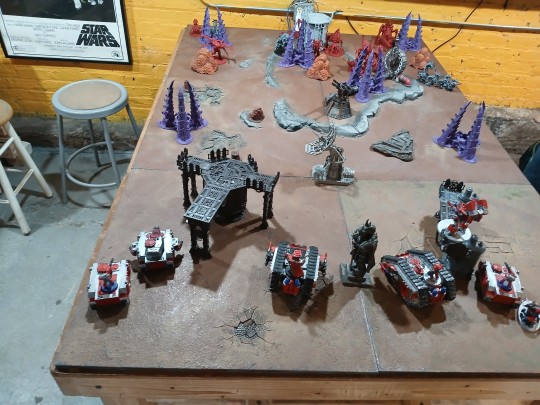

Ser Octavius surveyed his battleline. Preparing for the assault to come.
The Saguine Knights, Fleet Based Successor Chapter of the Blood Angels, had come to Forgeworld Snifflick after hearing the Distress Calls of the Covenant of the Omnisiah. The Skitarii defenders had done well to contain Hivefleet Behemoth, but they had been unable to push into the most corrupted parts of the Forgeworld. Today, Ser Octavius and Court Librarian Merlinius would change that.
The Tanks of Trebuchet Company were deployed. All that was left was the order to assault. The objective: to open a hole in Tyrannid Line, and to cleanse the birthing pods scattering the battlefield (the orange leave piles. Work with what ya got). He gave the order, and the treads of the Emporer advanced.
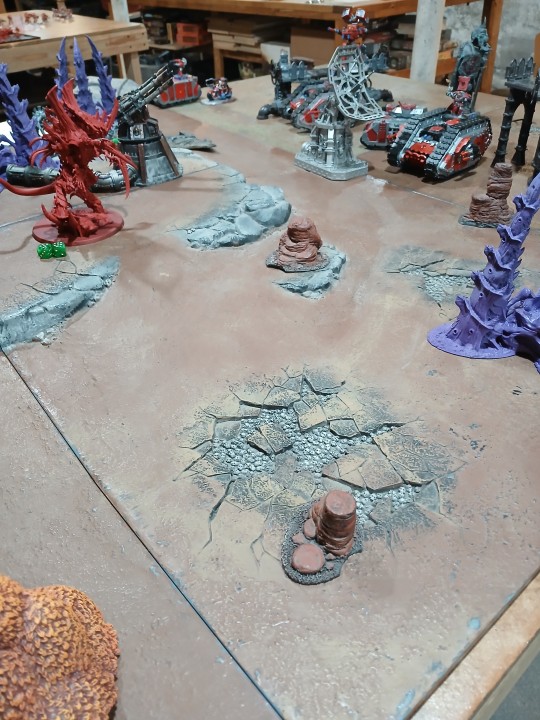

The Company advanced, bringing the full might of the Emporer to bear. Lascannons scoured the flesh of the Xenos, bringing down great beasts before they could even react to the assault. On the right flank, Ser Octavius and the Rhino Carrying Black Squadron ran into early trouble. The genestealers meant to break open the Rhino and Slow the Tactical Squads advance. Ser Octavius, in response, heroically charged the brood, sure he could bring the beasts low before they could open up the APC.
It is unfortunate, then, that Ser Octavius has the wrong of it. The Xenos was Cunning this day, and knew that killing him and the Librarian would be worth a hundred line brothers. The Assault Marines deployed from the landraider, hoping to save their Warlord.
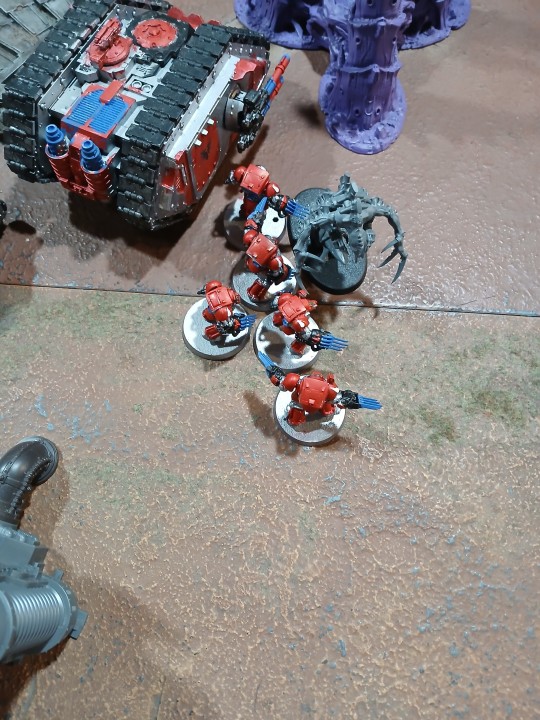
Unfortunately, it was too little too late. Ser Octavius was thrown from his bike, his armor torn asunder. As he lost consciousness, his thoughts were only of vindication, praying that Merlinius would finish the Job.
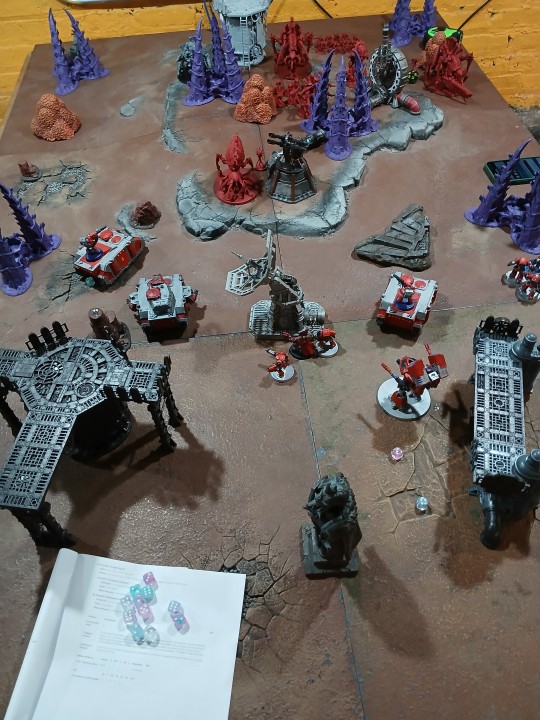
Merlinius would have no such luck. I'm fact, it was all the Librarian could do to survive and avoid a rout. Both Landraiders had collapsed under Tyranofex fire, and the objectives seemed impossible to secure. Meanwhile, Behemoth was out for Blood, bringing weapon after weapon crashing down on the Wizard and his honor guard. As the terminators around him fell, Merlinius ordered one last charge. They'd take this objective, or die trying.
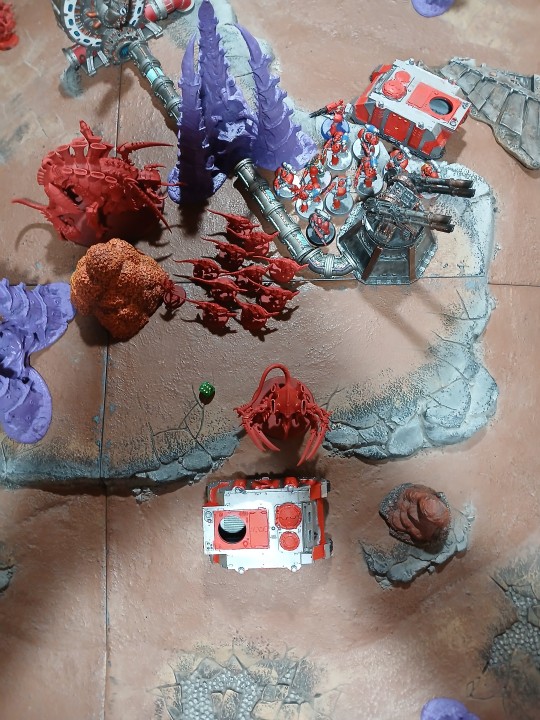

A final charge was ordered, to some success. Tactical Squad Green was able to take and hold the left objective, giving a path to victory. Tactical Squad black charged into the frey, hoping to hold the center and steal a victory. A last desperate push.
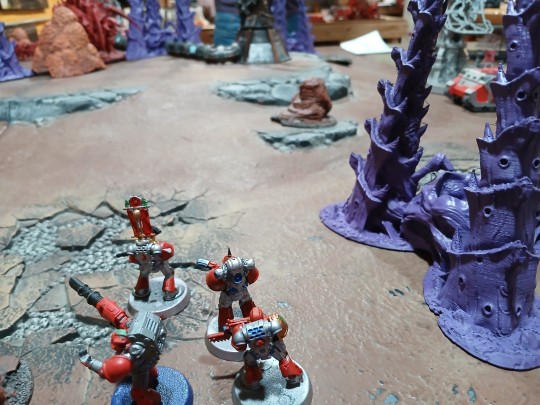
That ended not with a bang, but a whimper. Ineffective charges meant that time would decide this battle. Merlinius, the last of his Bodyguard dead at his feet, sounded a fighting withdrawal. The retreat saw the death of most of the enemies great beasts. The biomass lost today would be a terrible blow. They would hold the Xenos this day, true. But this was no victory. Just like the Skitarii before them, the Space Marines had failed to cleanse the planet. This would be a long campaign. Merlinius have the order. The Death Company would son be Unleashed.
#space marines#warhammer 40000#40k#arts and crafts#blood angels#narrative game#battle report#technically#fan fiction#tyranids#wh40k#your dudes
11 notes
·
View notes
Text
Towards the End
Lark: The Huntsman of Nostramo
Konrad Curze x OC
In the deep, dark, midnight, when they would lay together underneath the starless black of an enclosed room and speak of the things to come and the things that had long since passed; Lark found that he was most at peace.
He remembered how he would run his fingers through Nighthaunter’s long, oily hair and pick apart the knots as they spoke. Sometimes they would do more than speaking, sometimes less.
Regardless, fingers, arms, and hands would often get lost beneath the safe cover of a warm blanket, and would inexplicably turn up wrapped around the others waist or tracing a series of scars or creases. Moments like this would typically spark the beginning of a different series of nightly activities, something much more intimate in nature than their previous idle chatterings.
Lips would touch and press upon each other’s flesh; At first carefully, even hesitantly, but soon falling into a much rougher rhythm. Any iota of exposed skin was fair game for a new set of bruises or the mark of a sharp tooth or nail. The mix of loving kisses and harsher, seductive bites kept both guessing and ready for more.
Their actions where feral, and primal, as if driven more by instinct than any actual thought or cohesion from either party.
From there, it would escalate further until both where fully satisfied with the time spent.
Lark felt something stirring within him then, in the modern day, a deep, emptiness that would not go away. Was this sadness? Loss? Mourning?
He had already mourned; The loss of his sons, and now soon, the loss of NightHaunter, too. Even the brief recollection of one of those long nights didn’t serve to distract him for very long.
He knew, they both knew—, the cold, harsh, truth: The Dark King was going to die.
Shifting his weight, Lark sat up awkwardly, and turned to face the prone figure at his side. Even in the darkness, Nighthaunter’s grey-white skin stood out enough that Lark could easily find him without too much of a hassle.
He leaned forward and ran his hand over the primarch’s upper arm and shoulder. Lark could feel the emphasis of Nighthaunter’s muscles beneath his finger tips as he did so, and later the jagged, hard bone of his shoulder’s edge.
Lark wondered then if he had gotten thinner. Had he been eating properly? Or was it stress? Lark didn’t know, but he couldn’t help but worry.
Then NightHaunter started to awaken. Moving and stretching, he rolled over onto his back, his eyes slowly, lethargically opening. Those eyes, deeper, and blacker than the blackest black holes always captivated Lark; There was something about them that sent a terrifying chill down his spine, he didn’t know what, but he loved it.
“Song bird…”, Nighthaunter whispered, reaching for Lark’s hand and grasping his wrist, “Why are you awake…”? Lark sighed, moving closer to the primarch, “I couldn’t sleep”.
“Why not…”, he asked carefully, slightly cocking his head in curiosity. Lark sighed, settling down against Nighthaunter’s chest and laying his head on his arm, “It’s just… lately, my mind won’t quiet down, y’know”?
“You’re worried, but there is no need”, Nighthaunter stated, gently running his pointed fingers over Lark’s skin, “it’ll be over soon, the night will come to an end and things will be different. My father will have sent his minion to dispatch me, and you will no longer have to concern yourself with my welfare”. Lark adjusted himself, vaguely shifting away from the primarch’s grasp, stating “That’s ridiculous, because I’ll still be concerned, not only over your death but over everything.”
“You don’t even know if you’re going to die…”, he added.
“I do, Lark, I am aware of my future and all of it’s caveats, I always have been”, Nighthaunter hissed, “it’s set in stone”. Lark sat up, his tail thumping against the bed in displeasure, “But what if it isn’t? What if you can live, what if you’re wrong”? The primarch blinked at him, turning his head and exhaling a short, cold bought of air, before sitting up.
Even in his sitting position he towered over Lark.
“I’m not wrong, my visions have never been false”, He curtly took Lark’s face into a singular, large, clawed hand and held it so their eyes would meet, “never say such things Song bird”. He scrunched his nose, and gripped onto Nighthaunter’s wrist, before speaking, “Night… I don’t want it to be right this time”. The primarch softened his grip.
“I know…”, Nighthaunter’s eyes betrayed a softness for a moment, one buried deep within him, “but it’s to be, and now all we can do is let it happen”. He let go of Lark’s face, and rested his hand on his shoulder.
“Night…”, Lark spoke, gently taking the primarch’s clawed hand in his own, “whatever happens… I need you to know that I love you”. Nighthaunter nodded and closed the gap between them, holding Lark, his eyes focused on the distance, “I know Lark, I know…”
#Konrad Curze#Night Haunter#Lark: The Huntsman of Nostramo#Konrad Curze x OC#just nightlight things#wh40k#wh30k#warhammer fan content#warhammer 40k oc#warhammer oc#wh40k oc#primarch#oc x canon#warhammer fanfic#fanfic#fan fiction#writing#Cat-Skull AU
15 notes
·
View notes
Note
Is there a particular reason your meme tag is "Blood for the blood god memes for the meme folder"? You don't particularly strike me as the warhammer 40k type
Oh, no- I fuckin' love WH40K.
Admittedly, I got into it via If The Emperor Had A Text To Speech Device, which is a Hilarious Fan-Fiction-But-In-Voice-Acted-Video-Form. But I love the sheer outrageousness of the setting: the over-the-top-to-the-point-of-hilarity awfulness of the Eldar, the demented reasoning of the citizens of the imperium, the *PSIONIC ORKS*- everything is going wrong constantly, and if viewed as the satire it was originally written as, it's screamingly funny.
I have vauge aspirations of making a Tyranid army out of the box of spare Tyranid parts my Brother-in-law gave me and my collection of deceased insects. Just put a whole-ass tarantula on the table, it's fine.
322 notes
·
View notes
Text
Worldbuilding: Galactic Empires

My only complaint about the Prequels is that they needed MORE politics
If you've watched Dune recently, you must have noticed the whole Emperor and space noble families thing. And yes, it's likely you heard that in WH40k too… and I HOPE you know that's where the God Emperor came from, since WH40k took "inspiration" from everywhere from Dune to Star Wars. Which also has a Galactic Empire. Like so many other science fiction franchises.
In fact, if you're a science fiction fan, it's very likely that you're familiar with space or galactic empires, they seem to be common as dragons in fantasy. Despite the fact that an empire doesn't sound very futuristic, does it?
Where did all these Galactic Empires come from? Are they just a narrative tool or are they an actual possibility? How would states and societies work in space? Let's find out, and maybe I can give you some ideas on how to write fun galactic "empires" from both a narrative and plausibility perspective.
This is going be a long post. Perhaps my longest yet. But I hope you have as much fun reading it as I did writing it. Click down to continue.
First of all, where did these space emperors come from? In another post, I've talked about the influence of the idea of the rise and fall of the Roman Empire in English-language fiction. However, in science fiction, I would say the influence is more direct. The Foundation trilogy of Isaac Asimov, one of the foundational (lol) works of science fiction, was intended by the author, very explicitly, as a retelling of The History of the Decline and Fall of the Roman Empire by Edward Gibbon in a science fiction setting. He probably wasn't the first to think about a space empire, I'm very sure the term is older, but he certainly popularized it as a staple of science fiction. Now, if your contact with science fiction comes from movies, when you hear Galactic Empire you're of course thinking about Star Wars. But yes, Star Wars is also the same retelling, because Lucas was inspired in both Asimov AND Gibbon, even though I think we should appreciate Lucas' ability to bring it to life in the screen. Certainly, Isaac Asimov wasn't the first or the last to take inspiration in history to tell stories about the future.

The most influential science fiction work of all time.
At this point you're probably telling me (or not, I don't know you) about all other sorts of science fiction works that DON'T have galactic empires, or better yet, those that don't just transpose historical societies into the far future and imagine something entirely new (my personal recommendations on this area are Banks and LeGuin). And you'd be right. But the concept of a space empire seems popular and long-lived, much like feudalism in the fantasy genre, everyone has a picture of a sorts when a videogame or a book talks about a "galactic empire" or "galactic republic" or a "federation", an "empire" much like a shorthand name for "a country In Space", regardless of the presence of an actual Emperor or not. And so, it's worth exploring how this trope could, or not, work, so we can see the possible alternatives or more fun ways to approach it.
Besides, that's the title of the post. Galactic Empires.
So, let's approach this from the perspectives of Space, Time (or to keep with the theme, Spacetime) and Technology, and lastly, the most fun part, we'll explore some fun variations on this idea of galactic empires and societies.
Space:
Space is big, and I won't quote the Hitchiker's Guide to the Galaxy here, it would be groanworthy at this point. Let's do a quick exercise instead. Let's image a "modest" space empire, not even galactic, 2000 light-years across. Sounds quite big, it encompasses most of the visible stars we can see from Earth… however, if you project it into a galactic map, it's actually a very small piece of sky, actually 2% of the entire galaxy which is about 100.000 ly across. Now, according to the Atlas of the Universe, there are 600 million stars in a 5000 ly radius from the Sun. Jesus Christ. This is actually hard to estimate accurately as the true number of red dwarfs and brown dwarfs, the dimmest stars, are hard to count, but we already know those have planetary systems as complex as our own Solar System, even planets that could bear life. Let's scale back to our 2000 ly across space empire, again, just a small cozy corner of the Milky Way Galaxy, something that would look like a small, even tiny, nation in any setting of a galactic scale. This gives us 240 million stars (from the estimated 200 billion stars of the galaxy) in this space, which is still completely insane but let's work with that.
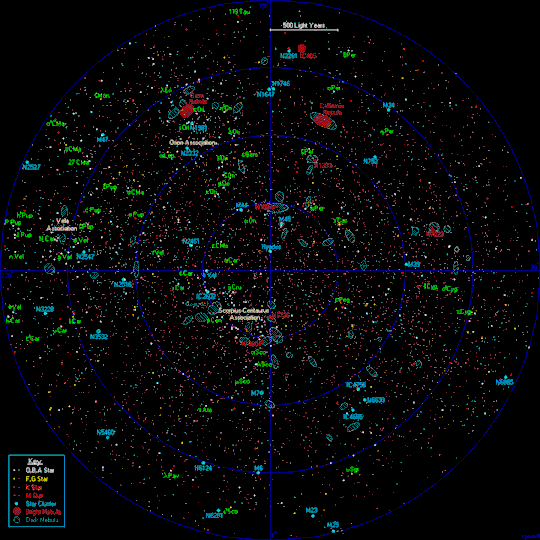
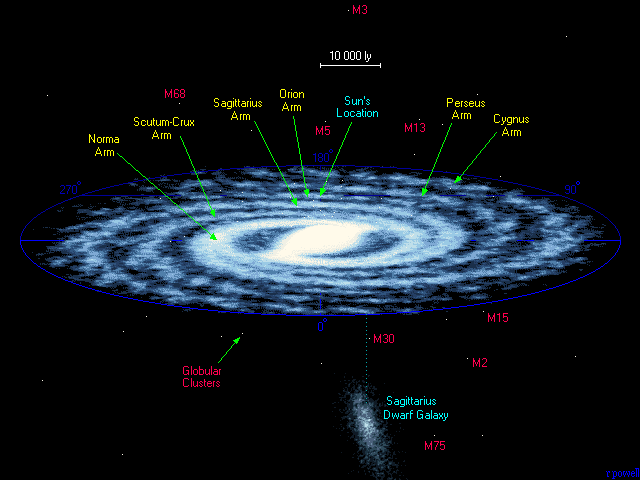
From Atlas of the Universe, so you can compare and contrast, the stars 2000 ly from the sun (ONLY the brightest ones), and the entire Milky Way. Notice how small 2000 light years truly are at that scale.
Even if I just told you that all of those systems might be as complex and rich as the Solar System, let's rather arbitrarily say only 5% of those 240 million are worth of note. Not necessarily having life (no way I'm getting into that yet), just worth visiting or living in for the resources or the views or the cantinas… whatever. That's 12 million star systems. Okay, let's refine this further. Let's say of those 12 million, most of them are the equivalent of gas stations or farmsteads, a couple thousand people at most. The REAL places where the action happens are the systems or worlds where millions of people live, and those are few and far between (this makes both common and narrative sense, as people tend to cluster in population centers where trade, resources, etc. are). Let's say, and let's refine this further so I don't get outrageous numbers, the average population of those systems is 100 million (about the size of Mexico, Vietnam or Japan. Many sci-fi works throw worlds of billions like Earth like nothing). And those systems are… uh, like 2% of THOSE 5% 'systems of note' (a flimsly concept already but play along). That's 2% of 12 million. We got 240.000 systems or worlds the population size of entire countries, with all that implies (economy, culture, politics). Of course, 240.000 multiplied 100 million gives this speculative fictional empire a total population of… (Jesus Christ, not the scientific notations), 2.4e+13, or TWENTY FOUR TRILLION PEOPLE.
Let's wind back and remember I tried my best to make a "small" empire for a galactic-sized setting, 2000 light-years across, that's just from here to Orion's Nebula for Gagarin's sake! A trillion people is just outside the realm of my imagination, or pretty much anyone's. Can you imagine any kind of goverment system that would be enough to provide any kind of meaningful governance to 24 trillion people? In the case of a space empire, can you imagine a single space emperor, a single person, deciding over them? Keep in mind that emperors don't rule on their own (we'll talk about that), they need bureacrats to make their will done, and vassals to govern their territories in their stead. This would apply even in democratic systems, you need representatives and civil servants and more.
Let's scale back a bit before I go insane. Instead of assuming territory, let's go with population. Assume a spherical cow space empire of… 40 billion people, that's reasonable right? You can picture that in your head? Five times the population of current Earth, no biggie, we can work with that, it's all cool. Now, how big would a goverment for such a population would have to be? We actually have reasonable answers. China has about 10 million civil servants for a population of 1.4 billion people, but that's only the administrators, not including all the teachers, healthcare workers, security forces, laborers, etc. employed by the state. India has 6.4 million for about the same population. Okay, so easy math, let's say that this space empire has 6 million bureacrats for 1 billion people, for our empire of 40 billion people, that gives us a total of 240 million… just bureacrats, nothing else. Yes, you could reduce that with technology by say, half. It still means an entire Mexico-sized country of bureacrats. Imagine.

Entire worlds of this.
NOW I WILL STOP THROWING NUMBERS AT YOU, and let's just think about what this means. If we assume a space empire like the ones common in science fiction, or just any kind of… goverment at all, we're talking about, at the lowest estimates, entire countries worth of state employees, if not whole EARTHS of bureacrats. You can guess how things can get really weird fast. Current goverments as we know them just won't work at all it even if technology gets more powerful. Leaving aside, for now, things like god-like AI adminstration (yeah, have you seen what they are like now?)… to exhert ANY kind of control, FTL or not (more on that below) you would need a very, very autonomous empire, to the point it might as well not exist at all. Why take orders from A Guy who is not only far away but also has no hope at all of actually enforcing them in any meaningful sense? Why call yourself part of his "empire" that not only cannot enforce anything upon you, but also cannot benefit you in any way? Big question, of course, the benefit of a galactic or even smaller empire, but we'll discuss that later.
What could work, however, is that instead of a centralized state like we concieve it today, or even a loose confederation, even loose alliances, even pretty much anything… 'empires' (as in 'countries') In Space could be "united" by common ideas and culture instead of any institution. Perhaps not even a written delcration or constitution, but shared ideas: a culture, a religion, an ideology. Lots of different strong mini-states (that might mean billions of people…) that all claim to be part of the same "civilization", but share no goverment at all at all, just the same 'idea', in a looser way that even the most decentralized goverments you can think of. You can say "well all countries are made up" but these would barely qualify as even that. Not even the Holy Roman Empire was this fake.
Perhaps even a single person as a symbolic focus point of unity? Which would be actually a score for the proponents of galactic empires in the most literal sense. But at the same time, such an Emperor would be completely powerless to interact with the entire galaxy. His plans for, I don't fucking know, education reform or tax breaks, would have to be filtered by literal millions of bureaucrats and vassals that at that point might do whatever the hell on his name. Military-wise, his armies would count as nations of their own. However, the overall guidance of a single person (or constitution…) as a symbol might make otherwise disparate worlds to collaborate on the same causes, being part of the same greater whole no matter the distance. So maybe, instead of a Galactic Emperor, a Space Pope?

OH MY GOD-EMPEROR WAS THE IMPERIUM REALISTIC ALL ALONG? Probably not, but also yes, let's keep talking.
By the way, I'm sure you're tired of big numbers now, but I did one possible calculation for the whole galaxy, a true Galactic Empire. Asuming just 0.2% (400 million) of the 200 billion stars are populated, with an average population of one million, the size of the smallest countries that aren't micronations. The total galactic population would be 40 trillion, or 40,000,000,000,000. Five thousand Earth populations.
Time:
Or rather, space-time. We'll talk about both, because what concern us is the speed of information and trade, and that also limits the size of our empires.
I'm sure you know by now faster-than-light travel is impossible. Most of space based science fiction has it, of course, for narrative purposes. We don't want Our Heroes to spend two thousand years to get to the lair of the Evil Space Tyrant, I don't either, and I'll discuss FTL soon. But let's start with no-FTL here, just like in real life, and a smaller "empire", much, much smaller than my previous examples. A mere 250 light years across. Let's not even calculate population now.
This, quite logically, means that the fastest your communications would flow is at light speed. So if your emperor issues orders to a nearby world, say, 5 ly away, you will get an answer 5 years later. For a more reasonable distance of 60 ly, you would know the results 60 years from the descendants of those who recieved the order (now, assume however they keep in constant conversation, just with a 60 year delay), and by then, things there would have changed 60 years from the capital. You get the idea, Einstein sucks, don't need to elaborate more. At first glance, this might be another point for old-style feudal star empires, though. What better way to guarantee your empire is working well over centuries than by having an hereditary class of nobles loyal to you, no matter how much time passes (results may vary). Of course, how would you even enforce that? Rebels might overthrow them and you'll learn about it a century later, and you'll have to send ships to quash the rebellion… or would you?
Is there a point to send ships to conquer other worlds in such a situation? What kind of resources (ah, the lifeblood of empires) could you control with such an empire where transport takes decades and industry is so developed you could, theoretically, make manufactured goods yourself? I'm assuming you can, because you can build spaceships to get there in the first place (not unreasonable), but what would justify creating an interstellar goverment controlling people, trade, resources, over light-decades? Normally, it's at this point where sci-fi authors make up Something (what Atomic Rockets calls "McGuffinite") to justify interstellar trade. In Dune, for example, it's Spice, which is kind of like, to steal a joke, petroleum mixed with cocaine. But otherwise, in a no-FTL setting (so, real life as far as we know) there isn't really the incentive to conquer or even form a goverment of any but the looser kind with other worlds. Trade, maybe, but those are long-term investments, it's difficult to think what kind of good or service would be so in demand would justify it. Especially when you consider that light-speed is your upper limit, and ships might be actually way slower than that. And I'm not even gonna begin to touch relativistic effects.

I was going to make a joke about blowing a quarter of your GDP in Star Destroyers, but have you heard of the South American Dreadnought Race? One of our dumbest moments down here, surely.
Add FTL, and things change, of course. Even very slow ships, that would take months to transverse a dozen light years, would be able to justify trade in luxury goods and passengers, for instance. This is not too far from real-life either, after all, European colonial empires had travel times in the months, and they had to install local administrations such as viceroys because of this, yet rhose places they were considered part of the same empire (most European empires could be rather considered a collection of "countries" and colonies, look at all the divisions of the Spanish Empire for instance). Faster and cheaper ships would of course, mean even more trade (here, I'm using 'trade' as 'communication between worlds', not necessarily implying capitalism, it could be mercantilism or even a command economy) between worlds, even perhaps the classic trope of agrarian and mining worlds feeding the rich core worlds. The Open Veins of Latin America In Space. Fun.
The speed of your ships and communications not only determines trade, but the power projection of your state (we can discuss 'stateless' societies too, there's plenty of fun to be had). If, again, your Galactic Emperor makes a Galactic Proclamation from the Galactic Palace near the Galactic Core (let's roll with that) and he has no FTL communications of any kind, it means that his commanding voice would reach the outer edges of the galaxy 100.000 years after, that is, almost ten times the history of agriculture on Earth. If he, however, has access to ships that can cross the galaxy in say, months, yes, perhaps he can have a series of vassals all over the stars (perhaps, we'll see…), and the faster things are, the closer they resemble our current fast-paced society, but not quite, given the available resources and space in… SPACE and the possible population, as we discussed above. As you can see, the speed of your FTL or lack of it determines everything.
There is another, more *realistic* option. Instead of individual FTL ships, you could have wormhole portals connecting worlds. This is more realistic in the sense that it's theoretically possible (though we have no idea on how to make one), but it also has some interesting implications. First of all, there is an implication that such a wormhole network would be expensive to build and maintain, requiring highly complex technology, material (I'm not sure what the hell exotic matter really is) and production methods, well, more high than what you'd expect from the usual. Second, it would be something preferably fixed, with hubs, planned routes and regular transit (and for writers, it easily allows you to map your universe). Such networks would be vital pieces of infrastructure, built and maintained by central authorities, drawing routes and transport hubs in space. Yes, indeed, almost like… space railroads.
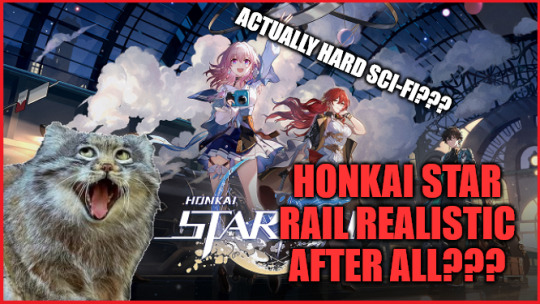
OH MY ASTRAL EXPRESS WAS HONKAI STAR RAIL REALISTIC ALL ALONG? (last joke I promise)
There is also a very strange effect about wormhole networks. Time is relative, as you know, and this is not a metaphor, it literally "flows" differently on how fast you're moving. The "universal" "speed" of "time" "seems" to be the speed at which matter moves in an expanding universe (red-shift and blue shift) as I understand it, but as you approach light-speed, time flows differently in your frame of reference. Wormholes are strange in the sense that they connect space AND time, the observable time in both sides of a wormhole would be the same, and as such, places connected by a wormhole network will "be" at the same "time". This has been talked about by some authors who have considered about wormholes in the context of space civilizations, and it's called (STOP!) Empire Time. So a space empire might not only imply a state ruling over a population and a territory, but also over a time. I have no idea how this works and it frankly makes my head hurt, but here is an analysis of transversable wormholes if you want to indulge or hit your head against a wall.
Technology:
As an extension from the previous section: Of course there is no working FTL method known in real life, as far as we know, light-speed is the upper limit for everything. Instead of constraining you as a writer, this can be one of your biggest assets.
Because if you're doing a space setting, the existence of faster-than-light travel and its speed is the most important decision you can take about it.
Got that? Did I emphasize that enough? You don't need to actually explain HOW your FTL system works, you can do some research and invent something, but you need to be clear, in your head, what it can DO: How far and how fast it can take you. A FTL system that takes months to go from star to star will be very different to one that takes hours to span the Galaxy like the hyperdrive of the Millenium Falcon. A FTL system that is cheap and can be installed in any tiny ship like in the Elite videogame would be different from the ones in Dune where interstellar travel requires enormous motherships and lots of drugs, or a wormhole network that needs massive infrastructure maintainment and probably a railway starway worker's union, or the case of no FTL at all. This is, again, the most important decision you could make for your setting, bar none. Got that? Let's continue.
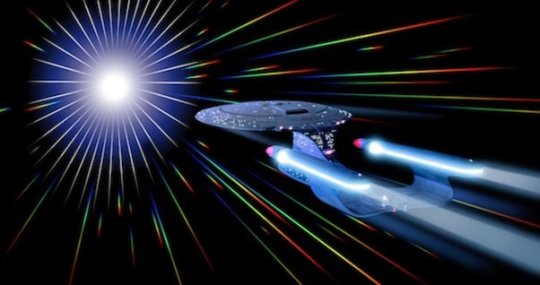
FTL is perhaps the only place in science fiction where I don't care about how it works, only about how fast it goes
Now, technology. Space empires, are of course, not possible without space travel being cheap enough (not talking about FTL, just regular space travel): shipping stuff to space should be about the same as shipping stuff by airliner or, well, ships. This is not unreasonable. Efforts are being made right now to lower the cost to access space, and while space agencies like NASA might look expensive, they are not NEARLY as expensive as the money wasted in say, stealth jet fighters or fucking advertising (people who say 'why spend so much money in space when we could fix our problems on Earth' seem to forget about that all the time. But I digress.). A technologically advanced, wealthy (as in production, not literal dollars) society could easily afford as much space exploration as they wish with no real effect at all in their quality of life, indeed, it would improve it. Space isn't as expensive as it seems. At its very, very core, a spaceship is just steel and propellant.
And steel and propellant are very, very easy (once you got the technical research to do it) to get in space. Asteroids are MADE of iron and metals, a single asteroid is richer than all of Earth's mines combined. Hydrogen is literally the most abundant element in the universe, and water is on plentiful supply (no need to steal planets for water) on comets and icy asteroids and moons. Carbon is apparently widely available in carbonaceous asteroids, and in our own Solar System, Titan, the moon of Saturn, is basically covered in hydrocarbons (yes, OIL IN SPACE). All those resources could be very much in demand for manufacturing on a planet like for example, a future Earth that has taken its industry up to space. What's more, it's only bringing stuff up from Earth/an Earth-like or more massive planet (fun sci-fi term for you: "down the gravity well") that's really expensive. Once you get there, you can get anywhere with enough acceleration and propellant. Once there is space infrastructure and industry (and I get a feeling that it might get up fast, given that space technology would need to be very autonomous and reliable), it can sustain itself without a mother planet. In fact, if there's something I imagine would be considered a luxury in spacer life, it would be truly organic things; plants, wood, meat, wool, and so much more.

i am average astronaut man i work 15 hours in the asteroid mines to buy one burger
Which brings us to the big question; what kind of life would be out there? After all, I gave you numbers of millions and millions of worlds, it's hard to imagine at least a few of those don't have alien life. This is the biggest outstanding question in astrobiology currently and so I won't pretend to even try to answer it (my personal opinion, if you must, is that complex Earth life is extremely rare, but by sheer number of planets, it might exist by hundreds of thousands in our galaxy alone). Instead, let's try to see how science fiction looks at it.
Heinlein, another of the foundational writers of science fiction as a genre, saw alien worlds as just another frontier to be settled. Rich alien fruit, fertile arable lands, and huntable or tameable creatures just waiting to be exploited, and alien species to trade exotic goods with (or conquer). While Heinlein was not the only and probably not the first to write this subgenre, he certainly got it popular, and lots of works on his same vein follow this "frontier spirit" kind of writing, where space is seen as the last frontier to be tamed by hardy colonists in a very yeehaw cowboy western setting, and you can actually see this replicated in many modern science fiction like Firefly and the more cowboy-ish parts of Star Wars. And yes, this is balantly an expression of the 'manifest destiny' Usamerican imperialist worldview.

lots of Politics all over this Science Fiction Adventure
And yes, this idea of 'habitable' planets ready to be colonized like in a 4X videogame is also not very realistic either. We haven't found any alien ecosystems yet, but as a biologist I can tell you they would be very different from us in ways you probably won't expect. We can discuss how convergent evolution could be, a world with oceans would probably have equivalents of 'fish', 'algae' and 'worms' (I can GUARANTEE there will be A LOT of worms), we could even find very, very similar life to our own down to the body plan. However, we most probably could not eat them at all (which might sound silly at first glance but is needed to have you know. agriculture.), or perhaps even live in the same planet as them. We live in a society planet where most of the plants and animals which evolved with us can't be eaten, and many of them are toxic. It's possible, entirely likely, that the alien equivalents of carbohydrates (ever heard of L- and D-Glucose?), proteins and other substances would be indigestible to us, allergenics, or outright toxic, probably in ways we can't even think off. It's likely we won't catch alien diseases, but that's because our cells (if they even have cells) are completely incompatible with their diseases, just look at how different animal, plant and fungi cells are, now imagine whatever the fuck might evolve in a completely different biochemistry from us. There would be no farmsteads and cowboys like Heinlein wrote, living in Mars would probably be more pleasant that living in a world where everything might be toxic, not because life evolved to be toxic, just because it didn't evolve with you. If anything, these' habitable' worlds would be treated like giant nature preserves instead, you can look but don't touch.
(In one of my own settings, I sidestep this by proposing panspermia, that is, the idea that life spreads across the universe by means such as comets (or aliens) and thus shares similaritites and can eat the same stuff. A bit of a cop-out, but it does allow one to get with similar kinds of life.)

NOOO ANAKIN DON'T EAT THAT PEAR IT EVOLVED HIGHLY TOXIC ALKALOIDS IN A DIFFERENT EVOLUTIONARY CONTEXT NOOOO
But humans, if the biophilia hypothesis is right, will need nature in their lives. This is where orbital habitats come in. You know, like the ones in Gundam? Orbitals such as O'Neill Cylinders, Standford Torii (yeah, that's the plural for Torus) as well as bigger and more complex thingmajings I will write their own post about someday, have been proposed since the 1970s with technology available then, and there is no reason why a civilization with an advanced space infrastructure wouldn't try building them and even be better at it. What's very nifty about orbitals is that you can really make them your own personal custom miniworlds. Designs like the O'Neill cylinder are big, able to house hundreds of thousands, even millions of people if build to the top, but why do that? Mess with the lightining, the rotation, or the interior to make them a winter wonderland or a tropical paradise. I expect that they would be built to feed space communities at first with food that isn't imported from Earth or grown in hydroponics, and later as places to live and customize however you wish; perhaps a community would pool resources together and say, hey, we want to make an habitat that looks like a Colombian cloud forest, or the Okinawan Islands. Once they get cheap enough, and given how abundant resources are in space they might be not even as expensive as most engineering projects here on Earth, I expect actually many, many people would want to live in them, and it could be probably be very affordable, and just natural for the people who are born and raised and live and die in them. Another thing about habitats is that they are mobile. Like I said, as long as you got enough propellant and propulsion, you can move anything anywhere in space. Even whole habitats could move and cluster together depending on the local politics. Perhaps, much like city-states were the basic building block for countries in antiquity, in the future, the basic organization bloc would be the Orbital. You could have alliances of orbitals forming complex political intrigue inside a single solar system (yes, like in Gundam).

OH MY PLASTIC MODELS WAS GUNDAM REALISTIC ALL ALONG? (I lied)
This all might make space empires pretty much an unnecessary anachronism. Habitats can grow their own food and resources are plentiful once you have the right technology. They can also be mobile, so they could act like migrating cities at will, choosing to stay with like-minded "constellations" or strike out on their own without the dictates of a central state. It almost looks like an ideal anarchist society.
Or does it?
There is something very important to keep in mind about life in space. The technology, that is, habitats needed for life in space will require lots of maintainance and resource management, which implies there must be strong coordinating bodies with very, very strict rules so that shit doesn't blow up and you lose all your air into space, or the resources of an habitat are mismanaged and you end up with a food or water or even oxygen crisis. There is a reason why space exploration is done by state agencies or corporations with huge state backing. Another of Heinleins's favorite tropes, Libertarians in Space, would be impossible in such a situation. Actually, in ANY space situation, and this is why this section is in technology. Living in space requires you to be able to maintain complex technology and manage resources. None of this can be done ad-hoc or be left to individualism, you have to have Rules and follow them to the letter. And also, the effect of living in your 'own little world' would probably mean people have a strong indentity sense towards their home habitat. This will mean a more communitarian attitude. But before you think I'm waxing poetic about utopian habitat cultures, keep in mind that this also can mean an authoritarian mindset. After all, cults and authoritarian regimes do have "strong communities" too. An habitat could be everything from a well-managed place with responsible citizens who look for the welfare of all, to a closed society where everybody does as they're told as long as the tech works. On the other hand, I doubt habitats in a single star system would stay isolated. They'll probably trade and communicate with other habitats, forming constellations and power groups, that would prevent this 'closed system'. However, I doubt they would be too amenable to interstellar authority. Who the hell do those people from another freaking star think they are to tell us what to do in our habitat?

To be serious for a moment, habitats can be really cool places in science fiction. Especially if you imagine they could host all sorts of enviroments, from the tropical to the polar.
As an addenum… what if you really want to live in a planet? In places such as Mars or the Moon, things would be… pretty similar to orbitals actually. Habitats separated by vast expanses of barren nothingness, only now a planet instead of space (better for maps, at least). But that isn't what you're thinking, right? What if you wanted to feel the open wind and sky instead of a canned world? Well, this is where terraforming comes in. Transforming whole planets is something theoretically possible, but that would require massive investments of resources, more massive than anything we can imagine, and time, centuries at the very, very least. So stupid ideas like "terraform Mars to escape Earth", which as far as I know is only held by dumbasses like Musk, just don't make sense. It doesn't mean that terraforming itself is a worthless idea, it is a very appealing one. No matter how cool you can make your habitat, it won't ever be Earth. It won't ever be a self-sustaining biosphere with its own ecosystem that could last millions of years. For that reason, terraforming is attractive, it's something way more than an artificial "can" orbital, it's a new living world. There is a certain mystique into bringing lifeless worlds to life, but I expect that instead of the dumb Musk "ESCAPE EARTH" idea, the motivation for terraforming would be to recreate Earth, perhaps for conservation reasons (you could have whole planets as natural reserves), perhaps for tourist reasons, perhaps for spiritual reasons or even artistic reasons. On the other hand, the methods you can use to terraform a lifeless planet can also be used to 'terraform' living planets, as we've long seen in our own world… this could be done with hostile purposes. I would expect us to be better than that, but we simply don't know.
To close this section and give this post an conclusion, I think that, since there are no real borders in space, then empires, countries, polities, whatever you wish to call them, will be formed by stacking building blocs in loose alliances or confederations. The most basic would be habitats, then constellations of habitats, then inhabited planets (though I doubt any but the most populated ones would qualify), and then star systems, but little above that, and I expect up to a certain, difficult to calculate limit of population and area (though way, way below even a fraction of a speculated galaxy), things would be just impossible to manage. The effort in bureacracy, infrastructure and state control needed to project power out of a star system and the sheer scale of space probably won't ever justify empires, much less galactic empires, but you could have very interesting variations on the theme.
Fun Stuff!
So, let's play a little with what I've told you. I'm going to write a few short scenarios that might be fun takes on the "Galactic Empire" or "Space Empires" you might be familiar with already:
The Poleis Model
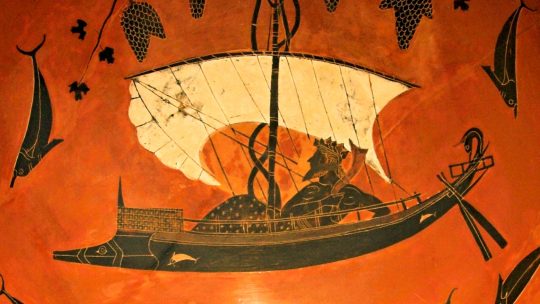
When the Greeks established their colonies around the Mediterranean, they didn't do it with the expectation they would be part of the same state or empire. They founded new poleis, new city-states, based on the constitution of the mother city (hence metropolis) but fully independent. The Phoenicians were much the same, with some of the daughter cities (Carthage means literally "new city") eventually becoming new cultures far from their home cities. Similarily, why should interstellar exploration mean the spread of a united state with a capital and all? Imagine that when interstellar ships depart, they do with the idea that they are going to create a completely new home, a new poleis, not an extension of the nations or organizations that sponsored them but rather more of a 'child' culture light years away from their motherland. As they develop in mostly isolation from each other, they will become new cultures on their own, while retaining ties to the ones most similar to them. This is, in my opinion, the most realistic scenario without FTL. With FTL, however, things get more interesting, as of course, Greek and Phoenician and other poleis didn't remain isolated light-years from each other, they had permanent contact. With FTL they could organize in leagues, perhaps even alliances for the ocassional military campaigns, trade and exchange of ideas, tourism and industry, and of course the Olympics.
The Wormholes Always Run In Time Model
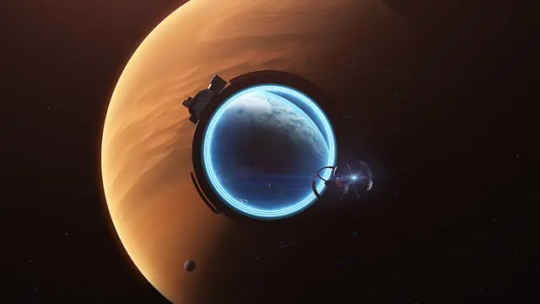
As I've said, wormholes are pretty much like space railroads. Railroads, like other big infrastructure projects, need a centralized authority to be built and maintained. And once you are the central authority that does so, you're already in charge of the biggest arteries of trade and communication. Which makes you basically an empire, officially or not. In fact, this is the closest I imagine a space society would resemble the states we're familiar with here on Earth. If you have control over transport and the hubs of trade and politics, and that transport and communication network allows you to implent your policies, your rule might go very far indeed, and indeed, your main hub might be a great capital, the main station of known space. Now, perhaps you might be imagining a literal space empire with nobles and all that. Why not instead something else? The Socialist Interstellar, connecting the many worlds of the galaxy through a five hundred year plan of railroad wormhole construction in the path to communism... However, this would mean that people outside of the wormhole network might develop in different ways, perhaps the equivalent of nomads to the great settled empires of antiquity. And given what I've briefly touched on Empire Time (*breakdances*), the expression "the portals always run in time" might imply even more than just an aphorism.
The Civilization Cluster Model
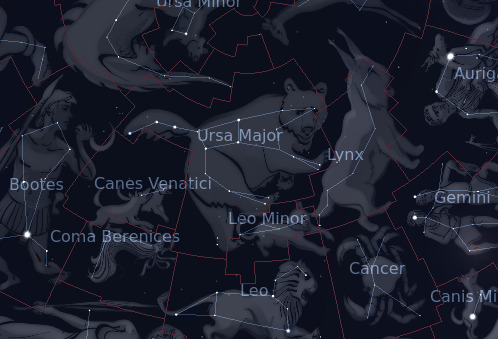
I'll admit this is taken from Poul Anderson, as quoted in Atomic Rockets, to which I owe an inmense debt for this post and so much more. The idea is this; space is big, as is well established. Even with FTL to shorten the distances, even if you could cross the galaxy in a few weeks, the sheer number of stars is still insanely massive. Why should any civilization 'colonize' those stars dot by dot, what value is there in invading or colonizing planets with incompatible biochemistries? And how could even begin to think how to administer a thousand different worlds, each one as complex as Earth itself, let alone an entire galaxy? In this case, civilizations, instead of spreading across the galaxy, would mostly remain in their own 'civilization clusters'; even with FTL, there are so many issues closer to home that the idea of projecting power outside is ridiculous. There would be trade, exchange of ideas, and so much more between these clusters, but never constant enough and never with the authority necessary to create a "Galactic Empire"… the worlds are too many, too diverse, too populated and too far away for that. An interstellar traveller could roam the Galaxy for years exploring these clusters spread away from each other, with their own unique idiosyncracies and civilizations inside, and then a vast expanse of mostly nothing outside them. Basically, space is too big. I like to see them as constellations among the dark sky, hence the artwork.
The No Man's Sky Model

To live in space, you need complex technology, but also resilient and durable technology ready for any kind of situation, easy to repair and replace. So eventually, I believe designs would be standarized so much that every astronaut will carry or own a collection of standarized tools (somehow this reminds me of prehistoric tool cultures). Now, even with FTL, there's perhaps little material incentive for people to leave their comfortable homeworld or habitat to live in cold space. But some will, perhaps because of the sheer thrill of it, perhaps very small bands of families or friends. With a standarized tool kit for any ocassion, these small bands would spread across space, much like ancient humans spread across the world. But instead of creating space empires, without a fixed industrial base, they would be nomads. Which doesn't mean they would roam aimlessly, they would be seeking new biospheres, new resources and new cultures, and gathering in temporary or permanent market places, festivals and pilgrimages. Perhaps they could even be the majority of humans in space, while most others stay cozy on Earth.
...
This was a very long post and it took a lot work to make, so I hope you had as much fun reading it as it was for me to write it. If you did, and if you would like to see more, I would be very, very grateful if you donated to my Ko-Fi below. Anything helps a lot especially since my country is not doing great at this time governed by a libertarian idiot (not even the fun space kind), and even a little tip encourages me to post more, I'm always working on your suggestions! You can also contact me by DM or asks if you need any help with your worldbuilding or just want to rant with me a bit! See you next time, and thanks for reading.
333 notes
·
View notes
Text
INTRODUCTION POST
Hi, I’m Samantha! They/Them
I’m a 28 year old, non-binary bisexual autistic with Crohn’s disease living in Salt Lake City. I have a partner and am not looking to date anyone else 💕
If you’re a minor DNI
I really enjoy meeting/interacting with cool and interesting people! I’m not, however, very good at checking my inbox 😅
Formerly - [this will be where I put my previous @ when I change this one]
Secondary blog - @floraldeposits
More below the jump:
Some of the things I enjoy/blog about (in no order):
🧄🥩🫚 Cooking & food (I have a lot of dietary restrictions thanks to Crohn’s, but the biggest ones are that I can’t eat dairy or wheat and I severely limit my fiber consumption)
🛸⚔️ Speculative fiction (fantasy, sci-fi, etc.)
🎲 TTRPG (D&D, WH40K, homebrew, etc.)
📺 Anime/manga (Vinland Saga, Full Metal Alchemist Brotherhood, Hellsing, Claymore, Delicious in Dungeon, etc.)
🌾🌊Politics (I’m a disabled queer, existing is inherently political for me. If you’re not for the autonomy and liberation of marginalized people we ain’t got shit to say to each other)
📚📄 Books (Musashi Miyamoto, Audre Lorde and Terry Pratchett are some of my favorite writers)
🤔💭🌞 Philosophy/Spirituality (Less interested in what the things I’ve lived around my whole life have to offer than I am in the ideas and perspectives that come from people and places outside of where I live. If you’re a Nietzsche fan fuck you.)
Funny (funny)
Music I Listen To:
Rammstein, System of a Down, Death Grips
Johnny Cash, Tammy Wynette, Willie Nelson
Phoebe Bridgers, Fiona Apple, Karen Dalton
Ramin Djwadi, Hiroyuki Sawano, Jesper Kyd
Tags:
#myface - Face pics
#personal - Anything I write or post myself
6 notes
·
View notes
Text
On Universes Beyond
I think there are two huge issues behind the normal Magic fan whining when it comes to Universes Beyond.
First, there's the fact that Magic is almost thirty years old, and this is the first major push toward using the game as a vehicle for licensed tie-ins. There's a lot of resistance to it based on decades of precedence. Fans are accustomed to the MtG team's versions of real-world inspirations like gothic horror, Greek mythology, and Japanese cyberpunk. Throwing literal Optimus Prime into the same exact game as a Voltron-inspired card feels like it's diluting what fans already love about the design.
A side note to this one is that there are lots of properties that fans don't want to engage with at all. The Walking Dead is brutal, and Warhammer even moreso. Magic traditionally doesn't cross into the levels of gore and violence that some of these things do. Other properties like Doctor Who are more science-fiction than some fans really want in their fantasy game (though I'd argue the game has always had scifi elements, and that most scifi properties aren't as devoid of fantasy as people seem to think).
Second, there's the fact that it shines a light on how bad the demand for some cards is, and how WotC often fails at reprinting cards enough to accommodate the players. To a certain extent, all Magic capitalizes on FOMO, urging players to get the cards while they can, before they shoot up in price on the secondary market after they realize they need it for a hypothetical future deck. By making unique cards that are obtained in new and less common ways than most other cards, it can feel like Wizards is forcing fans to purchase products they might not have otherwise. There's a feeling like it's a second Reserved List, which is something that people are terrified about.
As for both of these reasons, I don't personally feel that way, but I understand them. Universes Beyond is doing nothing Magic hasn't done in the past (or wouldn't have done, had it had the resources), and arguably is taking the game places that it should have gone a long time ago.
I love that we're getting a Lord of the Rings set, that we've gotten two whole Dungeons & Dragons sets (though I think those are being treated as crossovers more than licensed tie-ins), and that they're actively exploring bringing my favorite characters and franchises into my favorite game.
Do I hate that TWD and WH40K cards exist now, and that I may one day have to play a match with them in it? Sure. I despise those properties. You know who doesn't? My best friend who's finally interested in the game now that Rick Grimes can be his commander. That's a win for me, no matter how much I may dislike zombie soap operas. And now that he's interested in playing a Chun-Li card, I can introduce him to Narset.
In fact, my only issue is with the absolute glut of product we've been getting over the past few years, and the associated product fatigue. Seriously, let us rest our wallets a bit!
Magic is a game that's always changing. Faster now than it has in the past, for sure, but in ways that make it more appealing to new players. I have concerns over how much they can add to the game before they're forced to slow down, but ultimately, this doesn't seem like WotC is trying to squeeze every penny out of its existing fanbase in a desperate cash grab. If anything, it feels more like it's rushing to catch up with what it could have been all along.
13 notes
·
View notes
Text
Well I didn't have time to reblog that post about fan fiction, and then the author turned off reblogging 😭 But I'm going to post the answer anyway, for I was thinking of it all day.
That's exactly why I don’t read much gen. We've got enough books in wh40k universe that focus on the action and the plot. Nevertheless, the books fall short in terms of character analysis and evolution. And they completely shy away from exploring sex and sexuality. So we've reached the point where we see that fan fiction often includes elements lacking in the original works :) I'm guilty of doing this too.
I'm not familiar with other fandoms, but we've got plenty of authors in our small community who surely appreciate poetry and good writing, and are well-read. I came across magnificent poems and fairy tale-styled stories (here, I must express my admiration for Laylah and other talented writers on Ao3). Also, some smut stories are really good at depicting a character's thoughts and feelings. While their authors label them as 'porn' (tongue-in-cheek I suppose), these stories are really art.
Here's a link to the original post https://www.tumblr.com/cryptotheism/717902507821744128/i-dont-really-enjoy-fanfiction-its-not?source=share
2 notes
·
View notes
Video
youtube
Badass Astartes vs Psykers by
Astartes
158 notes
·
View notes
Text
I’ve feared this for a while
The news that the new guy behind manga and anime wants to cleanse Japan’s media depresses me.
In my pre-teens, girls were really.. negatively affected, mentally, by the body issues and complexes that said the girls in comics were just sex objects and the boys that liked comics were just being willfully indoctrinated in ‘male gaze’ patriarchy boot camps.
It was the same problem when you read WH40K stuff or played Pokemon in front of clergy in the late 80s/later on, the mid 90s. Your Christian friend might throw a fit about ‘satanic monsters’ or your feminist friend might get on a soap box to hear themselves talk about how enlightened and ‘critical’ they were, or browbeat you into their little fantasy that “having this conversation with somebody” was improving society. Y’know, to give themselves a little ideological dopamine rush.
So you had to be very careful what girl you tried to relate with about liking comic books, or else out would come the accusations that comic books were just jingoistic right wing brainwashing books that objectified women and upheld sexist societal standards. That meant many boys feared sharing their interests or collections for fear of being seen as a Worthless Boy to many girls. Whom were keyed, either willingly or trained by their queen bee friends putting the fear of ostracism in them, to parrot that party line.
But then something amazing happened...
Japanese media hit US shores. And it was cute. It was feminine, often to the point of androgyny and neotony. The depictions of girls were often hyperfeminine and cutesy, often bordering on the infantilized.
BUT. it was in this.. AMAZING cultural and art donut hole! Because the American radfems could speak ad nauseum about old white men being sexist and hateful and misogynist oppressive pieces of shit, cogs in a white supremacist cultural war machine...
But white girls cannot speak over non-white minorities to decry other cultures as sexist, oppressive and wrong. You noticing any parallels with Islam right now, in the hearts of many people that claim they’re “leftists,” and, “progressive,” and therefore cannot be sexist or racist? Oops.
And then oh look, more VISIBLE, FAMOUS femake MANGAKA and more integrated women in DECADES of establishment! Cutesy female-led incorporations of sexy things!! Oh NO!! They’re in that junior radical feminist blindspot; you’re not even supposed to ASK about the hypotheticals of if GIRLS sexualize themselves in media, because, “well girls in media wouldn’t do that, that’s just a disgusting boy thing. :^) So I refuse to even answer that. Until the industry and status quo in comics changes, it’s a boy’s club.”
Well here the Japanese manga community is! Featuring GIRLS, telling SEX JOKES and being scantly clad and SEXY and having FUN and being innocent and joyful! oh look and it’s written and drawn by MINORITY. WOMEN!!!! From one of those oppressed foreign non-white cultures!!! Where women doing stuff professionally is VERY progressive and also an undeniable contribution of women doing anything! Look how puuuuuuuuuuuuuuuuuuuuure this is! It’s everything you radfems claim you want! EVEN MINORITY REPRESENTATION!!!
Radical Feminism of the time FUMED at this thing in the periphery being both sexual and EVERYTHING they CLAIMED they wanted from media in order for it to be good, but they bit their tongues. Because all the girls that started to enjoy Sailor Moon, learned about the censorship of Japanese media by foreign companies to market it in the west and how Japan had more mature, ‘pure’ depictions of female nudity and saccharine sweet sexuality, and they were growing deaf and dumb to the radfem’s rhetoric.
And.. I really can’t underline enough. If you’re in your mid-late 30s now, you SAW the visible shift. From when comic books became taboo and the girls got angry about being infantilized, made into sex objects, everything sex related had a negative light that, “boys didn’t respect them for their MIND an SOUL,” and other gripes all evaporated when Sailor Moon’s blonde meatball ass swung in like a Japanese wrecking ball, like a Lisa Frank notebook heroine come to life.
And comics and fiction and the culture became FUN again. No more walking on eggshells, no more avoiding being painted in that disgusting negative light by radfems pretending they cared about equality so much as defining radical feminist largesse as “equality” and selling it to less deep down the rabbithole women as egalitarianism.
And now the very seat of that shining culture is under attack by insiders that are carrying the foreigner mindset. Entire manga studios are being build and founded under Black Lives Matter and Privilege Theorist mindsets. Anime itself is under attack as a social culture by these fucking assholes.
So, 3rd party studios won’t have to add in those disgusting, stupid jokes in Dragon Maid about “the patriarchy,” deviating from the dialogue of the original just to be propagandic platforms. They’ll platform and edit the original material by sympathetic “critical lenses” wearing editors and silver spooned CEOs.
I’m going to be honest. I’m going to be sad to see Japanese media get the same ridiculous standards and sentiments of censorship in the west. A moratorium on blood, mention of death, and any scene with a NIP SLIP will be seen as juvenile, childish, perverted, and objectification of the female body. Bugger the fact you can have all these things and it’s perfectly healthy, but no, “we MUST ENSURE OUR SOCIETY IS FREE OF BAD THINK! MEDIA IS SOCIETY’S PSYCHOLOGY! PSYCHOLOGY MUST BE PURE OF BAD THINK, ELSE SOCIETY’S SIGNING OFF ON THIS BEHAVIOR!” Bullshit.
We all remember growing up with anime and manga in an era when everything even hinting at sexuality and violence was behind a few layers of bubblewrap and judgemental eyes. Everything more mature than Carebears highlighted and stigmatized so overbearing parents could tell if it had anything their little Johnny or Sarah shouldn’t even have agency over knowing, as long as the parents could have it. It was a cultural and mental refuge. It was where you could have your nip slips and innocent sexuality without judgement or accusations of being a disgusting person.
And more importantly it changed a lot of girls opinions or prevented them from swallowing that party line and going deeper down that rabbithole altogether.
Imported Japanese media returned a sense of both youthful innocence as well as tolerant maturity to western expectations of art and illustrated literature and I argue bridged that gap between the dark and gritty for-adults 90s stuff parents wouldn’t let kids even know existed, and.. fucking Carebears.
We still have webcomics for anything-goes, anyone-can-access, but that will come under threat next. Just you watch. Demanding anything with a nipple or even a mention of sexuality must be behind a government watched paywall so you can’t even access it without committing theft or fraud that the government can punish a person or their guardian over.
I really, really, really do not want the Japanese to experience the sort of horrible social climate that I remember looming when radical feminism sold itself to the girls as progressive, and made men depicting women inherently oppressive and evil. Where it sustains itself on the hysteria and personal emotional insecurities and complexes of millions of women normalizing that into a societal expectation that they then fear being judged by.
It was truly an absolutely miserable period of time to grow up as a comic fan and as a person, because the stigma was biting. And the contrast between the warm, open, free, inviting and friendly waters afterwards?.. Like going from swimming in cold arctic lemon juice to tranquil tropical seawater.
The existence of Japanese manga and what it did to the social climate of comic and cartoons fans cannot be understated enough.
I mean, yeah, at the time, folks like Joss Whedon helped with Buffy and shit, but we don’t talk about him and people like him. It was the 90s.
3 notes
·
View notes
Text
Yes we will
A child stood still, silent, mortified. His face pale, crying but without tears to fall. A body lay at his feet. <i>mommy</i>.
A sound could be heard, <i>footsteps, heavy </i> a space marine? His armor looked like a dark gold with soot and dirt blackening the plates. On one shoulder a combi-melta slung behind his arm hung from a soiled brown leather sling. From his other side a human head dangled from his power pack. He held a small knife in his hand, his axe in the other.
He approached the child, his helmet speaker broadcasting his cackle in poor quality. "Was this yours?" He asked in a cynical pride. Before the small child could let out a sob, the champion raised his axe. "Khorne needs your blood!" As he swung the axe downward to cleave the child.
Pulsefire struck the champion across his chest, staggering him away from the child. Pathfinders had stumbled into the alley, their previous intent to remain hidden was now discarded as the tau could not rightly let this happen.
A nearby thunderhawk transport flew overhead and soon departed as a contingency of assault marines jumped down from the sky. Immediately landing on a building nearby and rushing down to tie their target into melee, blades and bolt pistols clutched.
The child stood frozen in terror as open conflict erupted only meters away. An arm wrapped around the boy, his feet rose from the ground. A pathfinder had run across the street and grabbed him away. The rest of the team followed, covering the escape.
A captain descended from the sky, his axe raised high as he flew straight for the champion. The Death Eagles were not the only ones jumping into this fight. Just at the edge of the city, chaos dropships were landing. Cultists piled out and began moving into buildings. On the other side of the small neighborhood appeared terminators at the end of lightning strikes. The outcast forces were getting enveloped into a trap.
Luckily for the death eagles and their tau allies, they too had contingency plans for such an eruption. A company sized element of crisis battlesuits descended, grav chute wearing scions landed, air assets soared in trying to establish air superiority, and friendly terminators began to appear while drop pods from both sides began striking the ground.
This mattered little to the shasui holding the crying child in his arms. His sobs audible. The team bunkered down and called in for an extraction. The response, a twenty minute wait for any vehicle capable of safely transporting a child.
The pathfinder team kept low, waiting without drawing attention. The ordinance began pelting buildings which held marvelously against the barrage. The shasui set the boy down on his feet and wiped the tear off his cheek.
"Are we gonna get the bad people from our home?" The little boy asked.
"Yes...

#warrior#warhammer40k#warhammer 40000#outcast legion#second legion#space marines#adeptus astartes#beautiful violence#heretic#tau empire#chaos#fan fiction#wh40k#captain#commander#hate#khorne#killhappy#rage#war#rotersand lyrics#we will kill them all
14 notes
·
View notes
Photo

retitle Wolf Axe captured from the Lions battle frenzy, NOT much of a real story
This is more a battle action book, than a biography of the Great Wolf. Ignored the casualties, except for the metabolic failures. Still most of the battle(s) make NO sense. Many times you wonder why the action is so fierce that 'true wolves' survive. YETCH! Better Title would have been the story of the Wolf Axe captured by from the Lions. Much of the story was/is inane. Not really recommended. Thanks, Harry !
Go to Amazon
Better than the 1st book in the series
Way better than the 1st book in the primarch series. This book tells the story of the start of the honor feud between the Space Wolves and Dark Angels. The story as told by Leman Russ shows the "human" side of this Primarch and somewhat of his brother the El' Johnson. The pace of the story was steady with no slow moments for me. All the parts were necessary to be included in the storytelling. Kudos to the writer and his' effor to bring to life one of the storied characters in the 30 k universe.
Go to Amazon
Must get
This is easily one of my favorite WH40K books, period. The reviews encouraged me to pick this up, and it delivers.
Go to Amazon
The Wolf King
This is the second title of the Primarchs’ series that I have read and, contrary to the first one (on Guilliman) which I found somewhat bland, I much liked this one. Although somewhat short, Chris Wraight has managed to pack a lot of substance into it.
Go to Amazon
Imperfectly Titled, But Very Satisfyingly Executed
Chris Wraight has joined the very top echelon of writers of Warhammer 40,000 fiction, and proves up to the considerable task of capturing one of the 18 Primarchs of legend, here...perhaps the most beloved. Those who come to it to learn of the Great Wolf will not leave disappointed, because Wraight is savvy enough to write a story about a legendary figure without *really* writing it about him. In truth, this short novel is not really about Leman Russ, any more than it is about Lion El'Jonson, Primarch of the Dark Angels, so much as it is about the well-known great feud between the Space Wolves and Dark Angels chapters. Both Primarchs figure prominently in the telling of that tale, of course...but by making it about something specific, and other than Leman Russ himself, Wraight is able to write through the smoke and fog of time and legend and preserve the stature of the character (indeed, both of them); too often, monumental characters rendered down in detail lose what made them mysterious and magickal, in the telling. The framework Wraight has chosen preserves that. The Great Wolf emerges still great. This *isnt* really a work about Leman Russ, as the title suggests--but that proves to be a good thing. I cannot imagine any fan of the Space Wolves--or indeed, 40K lore in general--will be disappointed in that.
Go to Amazon
Great battle scene between the Lion and the Wolf
Great battle scene between the Lion and the Wolf. Basically the majority of the book is a flashback that Leman is telling, with a nice little twist at the end explaining something from the beginning. Its awell rounded book at how a Space Wolf comes to be from beginning to the end even dealing with the problem that some Space Wolves have goign to far into their wolf sides. Good book overall, great book if you like Space Wolves! Leman is a great balance of mind and body.
Go to Amazon
Simply amazing
Okay I was literally shocked at how good this book was. I'm not really a fan of the Space Wolves or Leman Russ (especially after A Thousand Sons and Prospero Burns), but this is easily in my top ten of The Horus Heresy timeline. The feud between Lion 'El Jonson and Russ is brought to life and the honor duels between the Dark Angels and Space Wolves is explained. Awesome book, great job, Chris Wright!
Go to Amazon
Five Stars
great read
Go to Amazon
Five Stars
Space wolves story at its best
Leman Russ Prime Reading
Overpriced
2 notes
·
View notes
Note
I must say, reading enough of your page has got me pretty interested in WH40K but the material just seems so dense I have no clue where to start reading or what kind of background lore I should expect to buff up on. Any tips?
Well, remember that my stuff is mostly about the Horus Heresy, so take that into mind. I like the Horus Heresy because I find the doomed struggle of the Imperium more engaging than the simple grimdark of the 41st millennium from a writing perspective. That’s not to say that grimdark can’t be done well; some authors do it incredibly well. Good grimdark means focusing even on the individual victories, like Gittes in Chinatown, rather than just making everything brutal in a “life’s a bitch, then you die” scenario.
If you want to get into the Horus Heresy, I recommend reading the first three Horus Heresy books, Horus Rising, False Gods, and Galaxy in Flames, which covers Horus’s fall to the Chaos Gods and the Istvaan III atrocity. Plenty of good characters and a glorious doomed last stand await. If you want to get into the 40k Imperium, I recommend Gaunt’s Ghosts, by Dan Abnett. Very accessible fiction that doesn’t skimp on the excellence. You might also want to check out the Gathering Storm. since that has been the new advances to the Warhammer 40K lore including the return of the Traitor Primarchs, the 13th Black Crusade, the fall of Cadia, and the resurrection of Guilliman.
Believe it or not, If the Emperor Had a Text-To-Speech Device actually is a great intro to the Warhammer 40k lore. Having that up next to a wiki is actually a pretty good way to start getting into the lore, especially the early episodes where the Big E and Kitten explore concepts of 40K, which is as informative as it is entertaining. You can also check out If the Emperor Had a Podcast, Episode 0: White Scars, which goes into the White Scars and has a free-flow style that is quite entertaining.
Anyway, you might also want to pick a favorite legion and follow stuff regarding them. Both Space Marines and Imperial Guard units are typically based on historical armies. If you have a favorite historical unit, check and see if there’s a counterpart in the 40K universe. For example, the Tallarn Desert Raiders are 40K Bedouins. I’m an Imperium fan, so I follow the Imperium. Here’s a handy cheatsheet, and if other fans want to add in their own comments or additions, by all means do so:
Horus Heresy-era Loyalist Space Marine Legions
Dark Angels - Based on European knightly orders (and a few Native American motifs), the Dark Angels struggle with a dark secret that has stained their chapter’s history.
White Scars - Based on Mongolian cavalry, this chapter prizes swift hit-and-run attacks on their jetbikes by their cultured, honor-bound warriors.
Space Wolves - Based on Vikings and Germanic tribes, this chapter embraces honor, skill, and courage while struggling with their mutated gene-seed.
Imperial Fists - Based on the Prussian military and the Holy Roman Empire, this chapter embodies stoic discipline and intense knowledge of both how to build a fortification, and how to tear one down from the enemy.
Blood Angels - Based on medieval Catholicism and vampire myths. The Blood Angels embody savagery and nobility, cursed to hold back the Red Thirst and Black Rage that gnaws upon their psyche every day of their lives.
Iron Hands - Based on Celtic Highlanders with a healthy dose of cybernetics, the Iron Hands look to purge weakness from without and within, and are understandably grim, but resolved to complete their task.
Ultramarines - Based on Roman legionnaires, the Ultramarines are designed to embody all aspects of warfare and perform well at all of them.
Salamanders - Based on Damascus with a lot of fire fixations added in, the Salamanders emphasize craftsmanship as well as warfare, and value humanity highly to the point of calling out anyone who views humans as meat for the grinder.
Raven Guard - Based on Native American, Maori, and Australian aboriginal themes along with a healthy dose of modern commando influences, the Raven Guard are masters of stealth warfare.
Thanks for the question, Anon.
SomethingLikeALawyer, Hand of the King
20 notes
·
View notes
Text
Angel and Zero-"An Angel Too Big for a Shoulder"

https://forums.spacebattles.com/threads/angel-and-zero-wh40k-znt.500593/reader
Author: ThatWhichShouldBe
Official Summary: N/A
Fandoms: Familiar of Zero and Warhammer 40,000
Publication Date: March 2, 2017
Status: Last Updated April 1st, 2017
Length: 7.6k words, 2 chapters
Rating: N/A
Introduction:
I’m doing these reviews in a random order, and sometimes that leads to weird things. Angel and Zero is a lot like the previous fic I reviewed, I put it in my favorites because it showed potential, but it never ended up going anywhere. So this will mostly serve as an intro to two fandoms we’ll be seeing more of in the future.
The Source Material:
Chances are if you’ve heard of Familiar of Zero, it was through fan fiction circles, not through reading/watching it. Familiar of Zero is a series of fantasy light novels (light novels are vaguely similar to YA books) set in a European style land where having magic means you’re part of the nobility. Except one young noblewoman, Louise, despite attending magic school, can’t seem to do any real magic, hence the nickname “Zero.” But when it’s time to summon a familiar, usually a cool animal that helps wizards out with things, she summons a regular-ass high school student from Japan. Adventure ensues. Despite receiving an anime adaptation, which I’ve heard is not great, I don’t think Familiar of Zero made a huge splash in anime circles, probably because it came out before “regular schmuck ends up in a fantasy world” became such a popular genre. That changed when a fanfic author named gabriel blessing wrote a fic called the Hill of Swords, the premise for it being “Let’s take the male lead and replace him with a character from a different show.” Needless to say it caught on big time and spawned countless imitators, all with the same basic premise.
In contrast to Familiar of Zero’s relative obscurity, Warhammer 40,000 is probably the biggest tabletop wargame in the world. It’s a multimedia empire with countless books and video games set in the Warhammer universe. Set in the grim darkness of the 41st century, Warhammer 40,000 concerns the Imperium, a government that’s best described as “Catholic Space Fascists” as they battle space demons and aliens that make them look like good guys in comparison. Warhammer 40k is bonkers, it takes ideas from all over science fiction, puts them in a blender and makes every aspect of the setting as edgy and over-the-top as possible. I’ve never personally played Warhammer 40k; it combines several things I hate doing: math, arts & crafts, and spending lots of money. But I’ve played some of the video games and read some of the books. It’s good fun, even if it’s lost much of its satirical nature over time.
The Fic:
So the problem with most Familiar of Zero fan fiction is that they usually stick to covering the same couple of story beats before the author loses interest. Angel and Zero barely starts to get into those beats; the story consists of a prologue, one chapter, and an April Fools chapter. But I’m getting ahead of myself, the premise of this story is that Louise summons Sanguinius as her familiar. Sanguinius is one of the Primarchs, the demigod children of a guy called the God-Emperor of Mankind, he’s an angelic knight-in-shining-armor type who dies a tragic death in canon. One of the reasons to replace the main character in Familiar of Zero is to rectify some of the more, problematic, elements of canon. And Sanguinius is a good choice, he’s horrendously overpowered compared to the FoZ characters, but is also a super nice guy. This fic has a lot of potential, and the prose is decent, so I think I’ll still keep an eye on it in case it ever gets picked up again.
Next Time: Two Xbox classics collide in a showdown between first and third person shooters, second person wasn’t invited.
0 notes